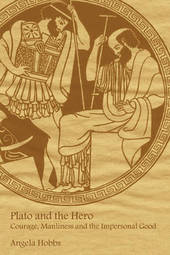
|
Plato and the Hero: Courage, Manliness and the Impersonal Good
Hardback
Main Details
| Title |
Plato and the Hero: Courage, Manliness and the Impersonal Good
|
| Authors and Contributors |
By (author) Angela Hobbs
|
| Physical Properties |
| Format:Hardback | | Pages:300 | | Dimensions(mm): Height 235,Width 157 |
|
| Category/Genre | Western philosophy - Ancient to c 500
Ethics and moral philosophy |
|---|
| ISBN/Barcode |
9780521417334
|
| Classifications | Dewey:179.6 |
|---|
| Audience | | Professional & Vocational | |
|---|
|
Publishing Details |
| Publisher |
Cambridge University Press
|
| Imprint |
Cambridge University Press
|
| Publication Date |
12 October 2000 |
| Publication Country |
United Kingdom
|
Description
Plato's thinking on courage, manliness and heroism is both profound and central to his work, but these areas of his thought remain under-explored. This book examines his developing critique of both the notions and embodiments of manliness prevalent in his culture (particularly those in Homer), and his attempt to redefine them in accordance with his own ethical, psychological and metaphysical principles. It further seeks to locate the discussion within the framework of his general approach to ethics, an approach which focuses on concepts of flourishing and virtue, rather than on consequences or duty. The question of why courage is necessary in the flourishing life in its turn leads to Plato's bid to unify the noble and the beneficial, and the tensions this unification creates between human and divine ideals. The issue of manliness also raises problems of gender: does Plato conceive of the ethical subject as human or male?
Reviews'Hobbs provides a stimulating interpretation of ... all Plato's dialogues ... in the time-honoured phrase she 'brings Plato to life' and enables us to see what was at stake for him in the discussions of thumos and andreia ... Hobbs' book makes fascinating reading both for the classical scholar and for the specialist in modern political philosophy. ... a book which is worthy of emulation and which will be hard to better in terms of scholarship, imagination or insight.' Polis
|